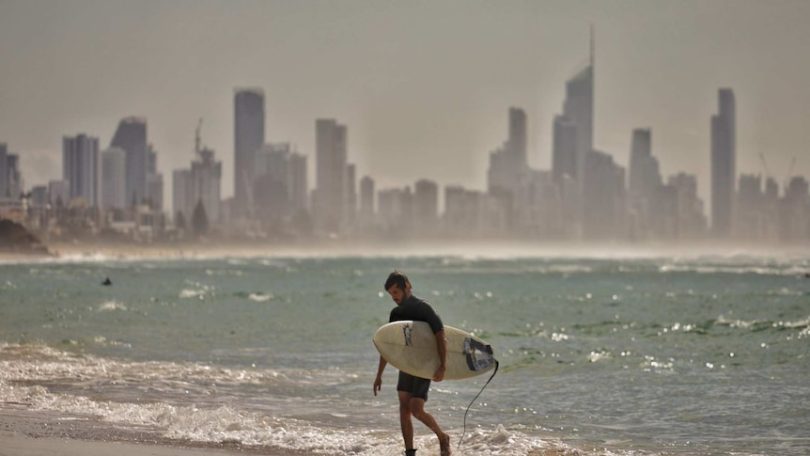[ad_1]
Burleigh Beach Tower manager Richard Arbon started fielding calls about Christmas months ago.
Key points:
- Gold Coast operators are very positive about the Christmas holiday period
- Queensland has eclipsed NSW as the most popular tourism destination
- International travellers have been slow to return
“Bookings have been really good, we’ve been totally booked now for ages,” Mr Arbon said.
“It’s been a really solid year, since the borders opened … we’ve just been flat-strapped.
“There’s no let-up in the demand at all, it’s probably as good as it’s been since I can remember.”
Destination Gold Coast head of stakeholders and strategy Rachel Hancock says the region is banking on a big summer – the first in two years without COVID restrictions, border closures or lockdowns disrupting holiday plans.
“We’re looking really, really positive for the Christmas period, our bookings are strong,” Ms Hancock said.
“It’s the first Christmas in two years not impeded by border closures so the operators, our 10,000 businesses that rely on tourism, are just really looking forward to this period.
“There’s a lot on offer for visitors who come back to the Gold Coast this Christmas.”
Tourism Tropical North Queensland chief executive Mark Olsen likewise said the “outlook is strong” for the holiday period.
“Many of our reef operators are back to seven days a week, our hotels are opening up some of those rooms that have been closed off over the last two years,” he said.
“The operators have got their staffing back up, [it is a] really important time for the industry.”
Brisbane Airport head of public affairs Stephen Beckett said almost three million passengers would pass through the domestic terminal over December and January.
“This is a post-COVID record,” Mr Beckett said.
“We’re also going to have around 14,000 passengers a day at our peak through the international terminal.
“We’re expecting this to be a very, very busy time.”
Mr Beckett said the advice is to arrive at least 90 minutes before a domestic flight and three hours before travelling overseas.
Last piece of the puzzle
Stretching kilometres over pristine rainforest canopy near Cairns, the Skyrail Rainforest Cableway lured visitors from around the world until COVID struck.
They haven’t come back.
“It has been a challenging couple of years, and we really think that we’re through the worst … we’re pretty much now back on par with where we were before the pandemic,” Skyrail general manager Richard Berman-Hardman said.
“Having said that, things aren’t quite back to normal yet,” he said.
“All our visitors are Australians.”
“We’re dying for international tourism to return to Cairns.”
For many operators in the Far North, it’s the last piece of the puzzle for tourism recovery.
Mr Olsen said it would take time.
“Markets like Japan and the long-haul markets out of Europe and the UK are nowhere near back to their pre-pandemic levels and we haven’t yet seen Australia reopen to China,” he said.
“International’s going to take at least another six months to recover here in Cairns and the Great Barrier Reef.”
Ms Hancock agrees recovery is slow with overseas visitors.
“Internationally, we still have a way to go there,” she said.
“With China still not in play, it’s looking like 2024-2025 where we’ll see a return to pre-COVID levels but Japan’s coming back really strong, New Zealand has really bounced back.”
“We have to look at new opportunities and new markets.”
Mr Beckett said it would take about 18 months to two years before the international terminal is back to pre-pandemic levels.
The number one destination
Queensland Tourism Industry Council chief executive Brett Fraser said the domestic tourism market has been keeping businesses afloat.
“What we’re actually seeing is Queensland for the first time ever has actually surpassed New South Wales so we’re now the number one domestic tourism destination in Australia,” Mr Fraser said.
“We’ve seen domestic tourism surpassing where it was in 2019, we’ve hit $19.6 billion, which is up from $18.8 billion in 2019.
“Outback Queensland’s done really well … the Whitsundays had a 98 per cent increase on the previous year … north Queensland has done well … the Sunshine Coast and Gold Coast also performed really well.
“The 13 tourism regions in Queensland sit within the top 50 destinations in Australia … but it’s not without challenges.”
Finding workers is a challenge
Mr Fraser says labour shortages are still having a big impact on the industry, with more than 6,000 vacancies within Queensland’s tourism and hospitality sectors.
“That’s fuelled by those international factors, we don’t have the international arrivals, backpackers or workers coming in,” he said.
“Operators are fatigued.
“There’s no silver bullet for this … we’re working with the federal government on visa processing … we’re trying to get people back into the country as quickly as we can,” he said.
Jan Claxton from Ocean Rafting says her business in the Whitsundays will not run at full capacity over Christmas because of staff shortages.
“It is a well-known fact at the moment that it is quite difficult to get people back into tourism and hospitality jobs,” Ms Claxton said.
“We need about 15 to 20 per cent more staff than we have at the moment for us to comfortably go through the season without us working too hard,” she said.
[ad_2]
Source link








